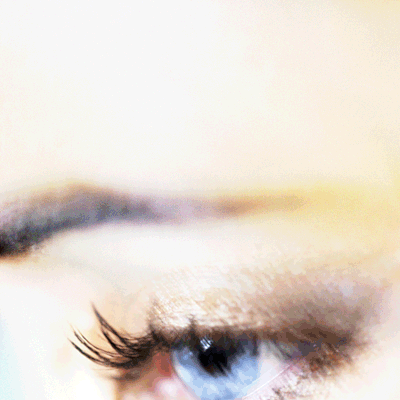
You probably don’t realize it, but you spend a good chunk of time each day walking around with your eyes closed. Scientists estimate that the average person blinks somewhere between 20,000 and 30,000 times a day; at two-tenths of a second per blink, that adds up to roughly 10 percent of your waking hours.
But while researchers have a pretty good grip on the numbers, there are a few big questions about blinking that remain unanswered: Why we do it? What’s going on in the brain as it happens? And why don’t we notice those brief moments when the world goes dark? Eyes are not unlike a camera, moving constantly among points of focus, explains Mark Wexler, a vision researcher at the Centre National de la Recherche Scientifique and Université Paris Descartes in France. But blinks frequently interrupt the stream of light hitting the retinas, and ultra-fast eye movements called saccades create jarring movements of the eyeballs even more often. And yet none of these things disrupt our vision, which seems continuous and stable.
One possible reason: The brain may work differently when the eyes are closed, whether that’s because of a blink or full-on slumber. “When you go into a deep sleep, it feels like there’s something that happens to your perception of time,” Wexler says. It’s happened to all of us — you wake up after what feels like just a few minutes, only to glance at a clock and find that hours have whizzed by. “You’re not undergoing normal mental function, and you’re so used to it that it doesn’t seem strange,” he says.
In a forthcoming study, Wexler and his collaborators decided to learn more about the relationship between blinks and time-perception by throwing off part of the brain’s time processing. In one experiment, researchers asked subjects to blink as they turned the lights off in the room, switching them back on just a few milliseconds after the participants opened their eyes again; afterward, they asked the participants about how long they’d perceived the darkness to last. “We learned that during a blink, time is discounted by 50–70 percent — that is, time passes two to four times as fast when the eyes are closed than during darkness while the eyes are open,” Wexler says. A second experiment, in which participants blinked while viewing an image of a square that briefly flashed on a screen, yielded similar results — in both cases, Wexler says, “time seems to speed up during the blink.”
It’s a finding that adds more weight to the idea that blinking must serve some sort of neurological function. (We blink much more frequently than the amount required to keep our corneas coated with tears, which was long thought to be the primary reason; in recent years, scientists have hypothesized that blinks must have another purpose, too.) A 2013 study found that during a blink, the brain undergoes something like a mini reset, powering down some of the parts connected to vision and attention. Since attention can alter the perception of time — think about how, when you glance at the second-hand of a watch, the first jump seems to take so much longer than the subsequent ones — it makes sense that blinks may alter how we experience the flow of time.
Wexler and his colleagues still aren’t quite sure why this happens, but Wexler suspects it’s something like a “slowing down of the neural metabolism,” possibly like what happens during sleep. Future studies could investigate this question by scanning participants’ brains, he says, but the high speed of a blink means the tools would need to be very high-resolution in order to record what happens.
But the researchers do know this much: When it comes to calculating time, our visual perception is pretty awful. Luckily, Wexler says, the brain has several different ways to keep track of time, including our finely tuned sense of hearing — distinguishing the timing of individual sounds, for example, is often critical to perceiving speech correctly. There’s even a separate system of temporal cognition, the brain’s ability to predict if you have time to cross the street before a car crosses the path, or even to hit a button after five seconds.
“There are many different kinds of clocks in the brain. When you talk about time, it’s a conglomerate of many different processes,” Wexler says. And with all those other systems in place, having a wildly inaccurate visual sense of time can come in handy — the speeding up of our visual clock may be what allows us to perceive the world as continuous, in spite of the endless optical interruptions caused by our constantly blinking eyes.




